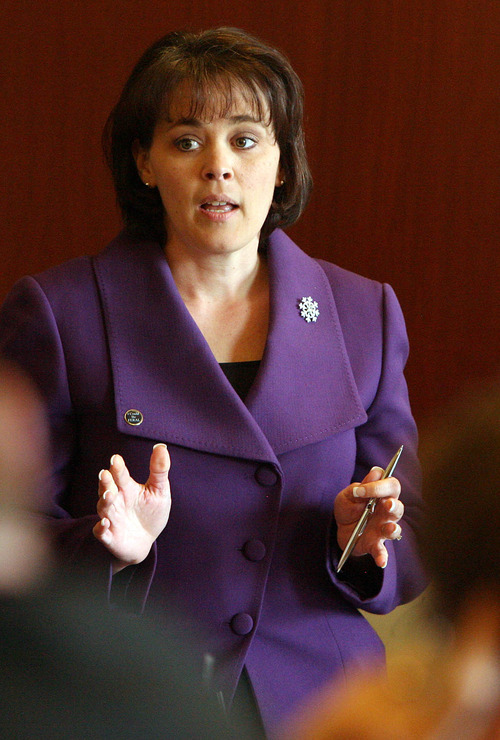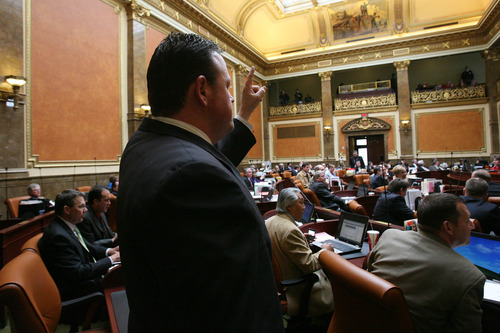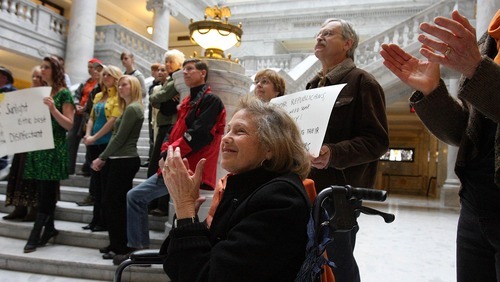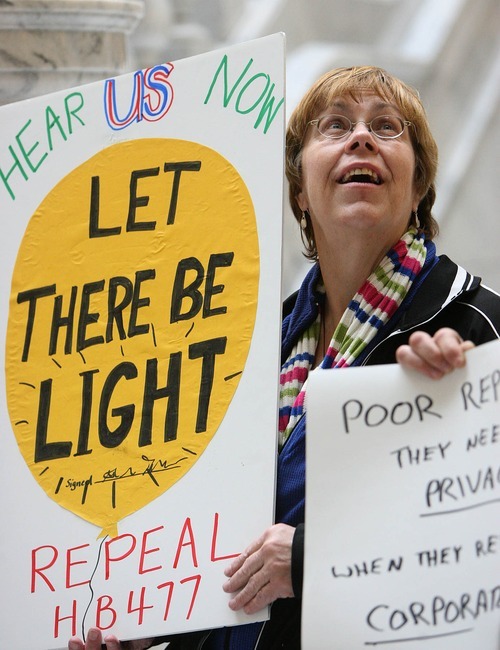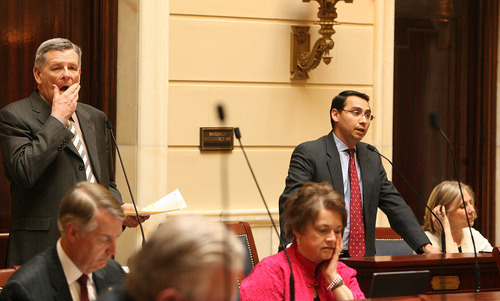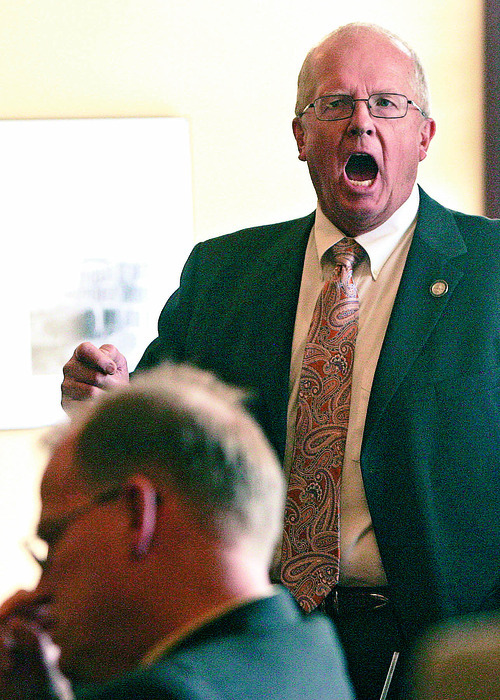This is an archived article that was published on sltrib.com in 2011, and information in the article may be outdated. It is provided only for personal research purposes and may not be reprinted.
After enduring two weeks of public fury, Utah lawmakers voted overwhelmingly Friday to repeal a bill that would have restricted public access to government records.
While Senate President Michael Waddoups accused the media of lobbying on the issue and others blamed the press for biased coverage that turned citizens against them, Sen. Stephen Urquhart said bluntly: "We messed up. It is nobody's fault but ours."
Urquhart added, "We can do much better, to where the citizens of this state will be proud of the Legislature."
The votes to repeal HB477 were resounding: 60-3 in the House, and 19-5 in the Senate.
HB477 had passed earlier this month just 72 hours after its text was introduced. Lawmakers said they moved swiftly to avert expected opposition by the media, and said they were acting to stop "fishing expeditions" by reporters seeking to embarrass lawmakers.
But it launched a two-week firestorm that included chanting protesters marching in the Capitol, the launching of a voter referendum seeking to repeal HB477, attacks by most major news media in the state, threats of lawsuits and advertisements assailing it by such influential groups as the Alliance for Unity and Common Cause.
Passage of the repeal temporarily hit a snag when the Senate amended the repeal bill to ask Gov. Gary Herbert to call lawmakers back into special session this summer to revise the Government Records Access and Management Act (GRAMA) and to have at least two formal legislative interim hearings on the law.
The House refused to accept those amendments, so the Senate dropped them. But it then added language in the Senate journal making clear its desires for those actions. Later, Gov. Gary Herbert sent a message to the Senate that he intends to do as requested.
Opponents of HB477 cheered its death.
"We declare this a victory," said Steve Maxfield, chairman of the Save GRAMA coalition that had been gathering signatures for the referendum against HB477. "The Legislature has recognized the will of the people."
Save GRAMA coalition board member Linda Peter-sen added, "The Legislature grossly underestimated the electorate's disillusionment with them. They thought this was a media issue. … The people of Utah have shown them they were wrong."
Mike O'Brien, legal counsel for the Utah Media Coalition of major news media in the state, said, "GRAMA is the people's law and today the people have saved it with this historic vote."
He added, "As we now discuss ways to improve GRAMA, we must be prudent to preserve the intent and spirit of the law the people have worked so hard to save."
Several lawmakers worried that repeal of HB477 could stop efforts by a working group evaluating possible changes to GRAMA. Senate Majority Leader Scott Jenkins, R-Plain City, said that is why he and others pushed for hearings and another special session — to keep pressure on that working group to move quickly.
"We still need to consider bringing GRAMA into the 21st century," Jenkins said.
House Majority Leader Brad Dee, R-Ogden, said the message he had heard from his constituents was clear, "that they would like input on what we may or may not do with open government."
"I feel good about the process that we're listening to the people," Dee said. "This is how our government works. I know we've all taken a lot of criticism, and sometimes I think unjustly so, but the important part is the message that we've received today."
Waddoups scolded media coverage that he said crossed the line into lobbying.
"They were out counting votes, pressing legislators to disclose their vote in advance, they were pushing undecideds to their side," he said. "We have a word for that up here. That word is lobbyist. I believe they crossed the line and became lobbyists on this issue this year."
He said fair journalists would admit their coverage "has been slanted," and while it helped kill HB477, he said changes still must be made to the GRAMA law.
Along with Waddoups, senators voting against repeal were Republicans Margaret Dayton, Orem; Stuart Reid, Ogden; Mark Madsen, Eagle Mountain; and Daniel Thatcher, West Valley City.
Thatcher cast his no vote saying that "the press has proven completely incapable of unbiased coverage," and that he doubts the media will negotiate changes to GRAMA in good faith.
In the House, only Reps. Mike Noel, R-Kanab; Curt Webb, R-Logan; and Neal Hendrickson, D-West Valley City, voted against the repeal. And there was little discussion of the repeal on the House floor Friday, which was the preference of House Speaker Becky Lockhart, R-Provo.
"I'm not interested in having us go out there and publicly flog ourselves over this issue with speech after speech, 'Oh, we're so sorry, et cetera, et cetera,' " she told colleagues in a caucus before the House vote. "I believe that's beneath the dignity of the House."
In that caucus meeting, Rep. Douglas Sagers, R-Tooele, noted that the phrase "Vox Populi" — Latin for "voice of the people" — is featured prominently in the House chamber.
"This is the people's chamber and they've made it very clear," he said. "We made a mistake. I've acknowledged to my constituents that we did make a mistake and I vowed to correct that mistake."
"I can tell you right down to members of our own family they want us to repeal," said Rep. Don Ipson, R-St. George.
But several House Republicans took aim at the news media for what they perceived as biased, unfair coverage that they said had turned the public against them.
"You guys are doing a lousy job of informing the people because you've got a spin on everything that happens up here," vented an angry Noel. He expressed frustration that the media hadn't reported that the Legislature passed HB477 to protect constituent correspondence, then he unloaded on the press for everything from coverage of the records law and public lands issues to perceived conflicts of individual reporters.
House Majority Whip Greg Hughes, R-Draper, said that with the repeal of HB477 he is convinced that the media will drag their feet and obstruct any changes.
Rep. Julie Fisher, R-Fruit Heights, a former journalist, said the law needs to be repealed, but changes have to be made to the state records law.
"If the media does not come to the table and realize that change has to happen to a 20-year-old law, they're going to look like fools in this," she said.
Lawmakers have been concerned that the current law exposes text messages, personal conversations and private information shared by constituents to release to the public. They also say that the number and volume of requests has become a burden.
HB477 would have exempted text messages, instant messages and video chats, required requesters to pay for attorney time and staff time for large requests, and eliminated language stating that government records are presumed to be public.
Bob Aagard gathered with about 50 other Utahns at the Capitol to rally for — and celebrate — repeal of the law.
Aagard disputed lawmaker claims that the media were driving the anti-HB477 train, saying opposition was wide and deep.
"I think the Legislature thought it would be able to pass it and all the noise would be over in a couple of days," he said. Instead, he and other activists vowed to keep the pressure on lawmakers to keep access open and government transparent.
Elise Lazar, a longtime activist for various causes, said passage of HB477 reflected a "new level of arrogance" on the part of legislators who "no longer see their role as public servants."
"They have made a grave mistake because they have awakened a public that has been too trusting for too long," she said. "The public will never go back."
Brooke Adams contributed to this report.


